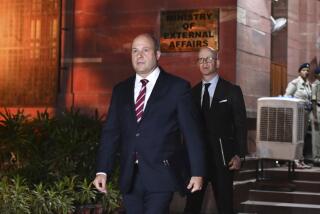Alleged Boss of China Smuggling Ring Presents Canada With a Conundrum
NEW YORK — China’s most wanted criminal has suddenly become Canada’s most unwanted guest.
Lai Changxing, accused by Beijing of masterminding a massive smuggling operation that spread to the government’s topmost levels, must remain in a Vancouver jail while Canada ponders whether to send him back to China, Canadian immigration officials decided Tuesday. But the case presents Canada with a conundrum: If he goes, he’s likely to face a firing squad. If he stays, Canada risks becoming a magnet for criminal refugees.
“There’s a balancing act,” said Ministry of Justice spokesman Peter Schnobb. “We try to look at both sides of the case, looking at the human rights aspect on one hand, and Canada becoming a safe haven for people coming here to avoid the death penalty. We don’t want to harbor these people.”
Canada has no death penalty and no extradition treaty with China, and it generally refuses to return fugitives to countries where they may be executed. Lai’s lawyers argue that 14 lower-ranking members of the smuggling ring already have been put to death and that, as the alleged leader, he is certain to face the same fate.
In special cases, the Canadian Ministry of Foreign Affairs, with the consent of the Ministry of Justice, can decide to turn over a fugitive to a country without an extradition agreement, usually with assurances that the death penalty will not be imposed.
But the Chinese government is making no promises. Earlier this year, Canada deported suspected embezzler Yang Fong to China, with Beijing’s assurance that he would receive a 10-year sentence. Yang received a death sentence and was promptly executed.
Lawyer Alistair Boulton said Tuesday that his client, Lai, “has never been accused of trafficking drugs, people or weapons.”
“His alleged crime is that he has deprived the Communist Party of money. . . . Is that cause to send him to his death?” Boulton said.
As the smuggling scandal brings down a series of party bosses and government officials in China--70 have been arrested so far--Lai’s legend flourishes in his absence.
Once an uneducated farmer, he rode the fitful opening of the country’s economy to become a high-profile entrepreneur. From the southern port city of Xiamen, he reportedly orchestrated a smuggling operation to bring more than $6 billion of oil, cars, cigarettes, guns and mobile phones into China, often with the help of the military and customs officials.
Lai was known for his extravagant lifestyle and is alleged to have paid extensive bribes to lure top officials to his outfit. Military intelligence agents helped him secure entry into Hong Kong in 1991, the Chinese government says, and naval vessels reportedly escorted his cargo ships into Xiamen harbor.
In his application for refugee status in Canada, Lai claimed that he has confidential information and military intelligence that would be so damaging to China’s government that it wants him dead. Lai reportedly entertained government officials and secretly videotaped them with prostitutes for blackmail purposes.
Although official corruption is the top complaint among the Chinese people, the threat to the government is economic as well as political. The Chinese government says Lai’s activities cost it $3.6 billion in unpaid duties at a time when that money was sorely needed by the state. His bootleg oil made up so much of the market that after the crackdown, the price of gas in Xiamen rose about 30 cents a quart.
Lai was the “biggest tiger” targeted in a countrywide crackdown, but his prominence also made him think that he was invincible, Chinese officials said. In an attempt to win amnesty, Lai offered a $240-million bribe to Chinese Premier Zhu Rongji, according to court documents.
But Lai’s political ties paid off. A Hong Kong official tipped him off the day before he was to be arrested, and he fled the country. He left behind millions of dollars, 11 residences, a soccer team and plans for Xiamen’s tallest building, an 88-story office tower.
He arrived in Canada in November 1999 with his wife, Tsai Mingna, and their three teenage children, and immediately bought a million-dollar home in Vancouver. Canadian authorities watched him carefully; they reported that he spent time with known Chinese gang members and lost half a million dollars gambling at a Niagara Falls casino, where he was arrested on an immigration violation last week.
Chinese authorities also were keeping a close eye on him and sent three agents to visit him in June. Two of his brothers had been arrested in the scandal, and one was brought along to pressure Lai to return home. He refused and, two days later, applied for political asylum in Canada.
The Canadian government has been wrestling with his situation since then.
There may be one politically palatable solution: Because Lai came to Canada on a Hong Kong passport, he may be sent there instead of China. Hong Kong has a readmission agreement with Canada and no death penalty. Although Hong Kong has been a special administrative region of China since 1997, it has never extradited a fugitive to the mainland because of differences in the judicial systems.
Sending Lai to Hong Kong could save face for Canada, but it may not save his neck. The Chinese government claims that Lai’s Hong Kong passport could be nullified because it was obtained with the help of bribed officials. Hong Kong officials would have to decide whether to invalidate the document and would certainly come under extreme pressure from Beijing to do so.
In the meantime, Canada mulls its next step.
“The government has been talking quietly with Beijing, negotiating this,” said Boulton, the lawyer. “But in Beijing, they have already held the trial and decided what his sentence will be.”
More to Read
Sign up for Essential California
The most important California stories and recommendations in your inbox every morning.
You may occasionally receive promotional content from the Los Angeles Times.










